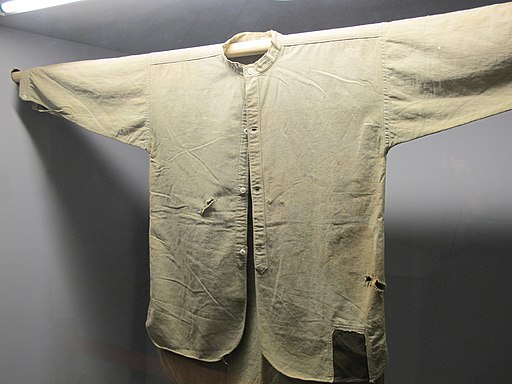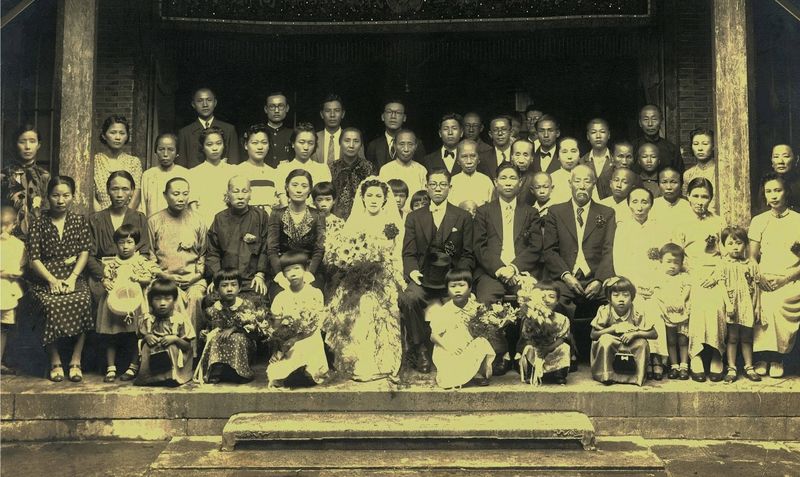Movie Trailer
The Book, Formosa Betrayed, was written by George H. Kerr, a US diplomatic officer in Taiwan.
Taiwan Retrocession Day (臺灣光復節)?!
Read:
Retrocession Day
Treaty of San Francisco (舊金山和約,1951)
U.S. Secretary of State Dean Acheson signing the Treaty of Peace with Japan, September 8, 1951.
Picture is from Wikimedia Commons
Read:
Treaty of San Francisco
Treaty of Taipei (台北和約,1952)

Picture is from Wikimedia Commons
Read:
Treaty of Taipei
Treaty of Taipei had no claim to sovereignty
Lin Mosei (林茂生,1887-1947)

Lin Mosei (林茂生, 1887–1947) was the first Taiwanese to receive a bachelor of arts from Tokyo Imperial University (now University of Tokyo) under Japanese rule (1895–1945). In 1929, he received a doctor of philosophy from the Teacher College, Columbia University. He was a student of John Dewey and Paul Monroe. The two professors tried to persuade him to stay and teach at Columbia University after his graduation, but it was in vain. Lin Mosei cared for education in Taiwan greatly, so he went back to Taiwan. In 1945, he became the dean of the College of Liberal Arts at Taiwan University and founded a newspaper, People News, to criticize and give advice to the Chinese Nationalist government. One day, the governor-general of Taiwan, Chen Yi, sent two people to take Lin Mosei to the office to have a chat, and Lin Mosei never came back. His family was never able to find his body and bring him home.
Read:
Lin Mosei
Seventy-year-old thesis still seen as valuable today
Huang Ma-Dian (黃媽典, 1893-1947)

Picture is from: https://commons.wikimedia.org/wiki/File:Ng_Ma-tian.jpg
Huang Ma-Dian (黃媽典, 1893–1947) was a doctor who treated the poor free of charge. He was also one of the founders of the Chiayi Bus Company and the chairperson of the Automobile Corporation. After World War II, he became the president of the chamber of commerce in Tainan County. In 1946, he was elected to be the Tainan County councilor. He was accused of being the leader of insurgents in the 228 Incident. The soldiers put a sign on his back and tied him up. Then they chained him to a jeep. He ran and fell after the jeep. Eventually, he couldn’t run anymore, so he gave in. The jeep dragged him to Chiayi Circle, and the soldiers executed him by shooting.
Chen Cheng-Po (陳澄波, 1895-1947)

The shirt that he wore when he was killed.

His Painting: Street of Chiayi Town

Reading:
Life and death on the streets of Chiayi
Start Out From 23.5°N: Chen Cheng-Po
Wang Tian-Deng (王添灯, 1901-1947)

Picture is from:https://commons.wikimedia.org/wiki/File:王添灯.jpg
Wang Tian-Deng (王添灯, 1901–1947) was a provincial councilor and a chairman of the newspaper who criticized the corruption of the Chinese Nationalist government officials. The Chinese soldiers poured gasoline on him and burned him alive. Then they dumped his body in the Tamsui River (淡水河).
Wu Hong-Chi (吳鴻麒, 1902-1947)
Picture is from:
https://www.taiwancon.com/229366/中壢吳氏家族─吳鴻森、吳鴻麒、吳鴻麟.htm
Wu Hong-Ci (吳鴻麒, 1902–1947) was a judge who hated the corruption of the Chinese Nationalist government. He was particularly hard on the cases of corruption. His wife found his body and took him home. His coat, watch, and shoes were missing. He had wounds all over his body, and his testicles were cut off and put into his mouth.
Shih Jiang-Nan (施江南, 1902-1947)

Shih Jiang-Nan (施江南, 1902–47) graduated from Kyoto Imperial University (now Kyoto University), the second Taiwanese to receive a doctor of medicine under the Japanese rule. He was well respected in Taiwanese society, so people recommended him to be a member of the 228 Incident Settlement Committee. However, because Shih Jiang-Nan had malaria at the time, he didn’t involve the committee affair much. One day, a person knocked on and broke the door of the clinic. The man took Shih Jiang-Nan away, and his family never saw him again, not even his dead body.
Tang De-Jhang (湯德章, 1907-1947)

Picture is from: https://commons.wikimedia.org/wiki/File:湯德章律師.jpg
They tortured him all night to get the list of names of Taiwanese elites and students. He never gave in. His ribs were broken, and his fingers were swollen. After they put a sign on his back and tied his arms to his back, they took him to parade in the street. Before execution, the soldiers kicked him and forced him to kneel down. He refused. He shouted and yelled at the soldiers. The bullets flew through his nose and forehead. His blood and brains were everywhere, but he stood still with eyes that glowered for a while. Eventually, he fell on the ground, his eyes still wide open. He saved thousands of Taiwanese intellectuals with his life. His name was Tang De-Jhang (湯德章, 1907–1947), a lawyer who often defended people against Japanese people’s bullying at a low fee or for free.
Read:
Tang Te-chang
Ye Ciou-Mu (葉秋木, 1908-1947)

Picture is from:
https://commons.wikimedia.org/wiki/File:屏東參議員葉秋木.jpg
Ye Ciou-Mu (葉秋木, 1908–1947) was a city councilor and a chairperson of “the 228 Incident Settlement Committee” in Pingtung County. The Chinese soldiers cut off his nose, ears, and sex organ, and then they took him to parade through the streets. In the end, they shot him to death.
Siao Chao-Jin (蕭朝金, 1910-1947)
Picture is from:
https://www.taiwantt.org.tw/taiwanspirit/frame/frame38.htm
The Chinese soldier used the gunstock to beat Siao Chao-Jin (蕭朝金, 1910–1947), a reverend, and forced him to kneel down, but he refused. He said, “I only kneel down to God, never to people.” Then they shot him to death.
https://www.taiwantt.org.tw/taiwanspirit/frame/frame38.htm
The Chinese soldier used the gunstock to beat Siao Chao-Jin (蕭朝金, 1910–1947), a reverend, and forced him to kneel down, but he refused. He said, “I only kneel down to God, never to people.” Then they shot him to death.
Wang Yu-Lin (王育霖,1919-1947)
He was a prosecutor and a high school teacher.

A picture of their engagement in 1941

Wedding

Pictures are from Wikimedia Commons
Wang Yu-Lin (王育霖, 1919–47) graduated from the Department of Law at Tokyo Imperial University (now University of Tokyo) and passed the examination of National Judges and Prosecutors in Japan. He worked in Kyoto District Court and also was the first Taiwanese who worked in Japan as a prosecutor. After the Second World War ended, he and his family moved back to Taiwan, and he was hired to be a prosecutor in Hsinchu (新竹) District Court. He was a righteous man who wasn’t afraid of or in favor of the people who had power and money, which got him into trouble. He revealed the corruption of the mayor and the commissioner of the police department. The mayor took revenge during the 228 Incident, arresting Wang Yu-Lin and torturing him brutally for days in the prison. At the end of March, they executed him and dumped his body into Tamsui River (淡水河). His family never found his body.
Wang Yu-De (Mandarin)
Ong Iok-Tek (Minnan)
Read:
Ong Iok-tek

A picture of their engagement in 1941

Wedding

Pictures are from Wikimedia Commons
Wang Yu-Lin (王育霖, 1919–47) graduated from the Department of Law at Tokyo Imperial University (now University of Tokyo) and passed the examination of National Judges and Prosecutors in Japan. He worked in Kyoto District Court and also was the first Taiwanese who worked in Japan as a prosecutor. After the Second World War ended, he and his family moved back to Taiwan, and he was hired to be a prosecutor in Hsinchu (新竹) District Court. He was a righteous man who wasn’t afraid of or in favor of the people who had power and money, which got him into trouble. He revealed the corruption of the mayor and the commissioner of the police department. The mayor took revenge during the 228 Incident, arresting Wang Yu-Lin and torturing him brutally for days in the prison. At the end of March, they executed him and dumped his body into Tamsui River (淡水河). His family never found his body.
Wang Yu-Lin's younger brother, Wang Yu-De (王育德,1924~1985).
He was a scholar and the early leader of Taiwan independence movement. He was an expert in the field of Minnan language. Here is a documentary film about him.Wang Yu-De (Mandarin)
Ong Iok-Tek (Minnan)
Read:
Ong Iok-tek
228 Peace Memorial Park (二二八和平紀念公園)
Taipei 228 Memorial Museum (臺北二二八紀念館)


The memorial sugar cans are dedicated to the Taiwanese Peasants' Union (台灣農民組合) and the leader of the union, Jian Ji (簡吉).


Taipei 228 Monument (台北二二八紀念碑)

Pictures were taken by Tsai Chia-Ling. All Right Reserved.
Read:
228 Peace Memorial Park
228 Peace Memorial Park
Subscribe to:
Posts (Atom)


